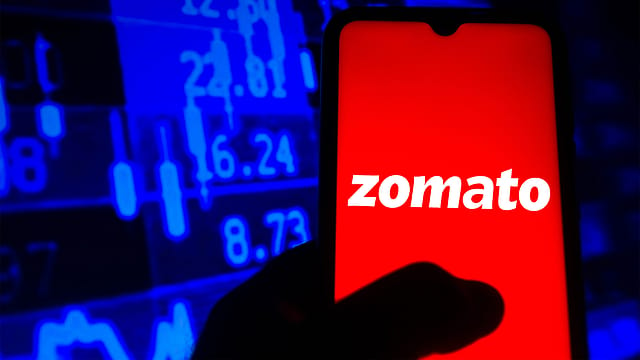Tiger Global exits Zomato by selling stake worth ₹1,124 cr; stock rises
ADVERTISEMENT

Shares of Zomato continued gaining streak for the second consecutive session on Tuesday, a day after the U.S.-based hedge fund Tiger Global exited the online food delivery company by selling its remaining stake in the company. Tiger Global, through its investment vehicle Internet Fund IV, offloaded equity shares worth ₹1,123.85 crore through open market transactions on August 28. The fund sold 12.34 crore shares, or 1.44% stake in Zomato, at an average price of ₹91.01 per share, as per bulk deals data available on exchanges.
Tiger Global, via Internet Fund IV, owned a 5.11% stake in Zomato before the foodtech unicorn launched its IPO in July 2021. In August 2022, Tiger Global diluted around 18 crore shares in the restaurant aggregator and reduced its shareholding in the company to 2.77%, following the end of the lock-in period for pre-IPO investors.
Meanwhile, shares of Zomato were trading 1.3% higher at ₹93.51 on the BSE today. Early today, the stock opened a tad higher at ₹92.61 against the previous closing level of ₹92.33. In the first hour of trade so far, the largecap stock gained as much as 1.5% to hit a high of ₹93.72, while the market capitalisation climbed to ₹80,460 crore.
In the past seven months, Zomato shares witnessed strong rebound after hitting a 52-week low of ₹44.35 on January 25, 2023, aided by improvement in the financial performance. At the current price level, Zomato share price has more than doubled from its 52-week low levels.
The stock has risen 75% in the past six months and 55% in the calendar year 2023. In the last one year, it gained 58%, while it added 11% in a month. The stock has delivered a negative return of 26% since its listing on the stock exchanges in July 2021 as the homegrown food company had a forgettable first year, post market debut.
However, Zomato turned profitable for the first time during the June quarter of this fiscal, driven by operational improvement in the food business. The food delivery company posted net profit of ₹2 crore in the first quarter of FY24 compared to a loss of ₹186 crore in the year-ago period. Revenue from operations soared 71% year-on-year to ₹2,416 crore during the April-June quarter of the current fiscal as against ₹1,414 crore in the corresponding quarter of the previous year.
Revenue from its business-to-business subsidiary Hyperpure grew 126% year-on-year to ₹617 crore in Q1 FY24, driven by growth across Zomato’s core restaurant supplies business as well as the newer quick commerce opportunity that it started tapping a couple of quarters ago. The company’s dining-out business also showed improvement by posting ₹515 crore of GOV through dining-out in India, which was around 7% of the GOV Zomato’s food delivery business during in the same quarter.
Domestic brokerage JM Financial in a recent report said that Zomato's stock is likely to be volatile in the near term on account of market speculation around possible exits by some pre-IPO shareholders (VC/PE/Chinese investors) of the company as well as erstwhile shareholders of Blinkit who had received it under a share swap deal. Zomato acquired Blinkit, a 10-minute grocery delivery startup, in a $568.1 million deal in August last year. The startup was formerly called Grofers.
Zomato had issued fresh equity shares to all the selling shareholders of Blinkit as consideration for the M&A last year, at an implied per share price of ₹70.76. Pursuant to the transaction, Zomato had negotiated a 12-month lock-in for these shares, compared to the statutory lock-in requirement of 6 months. The BSE fillings and company disclosures suggest these shares became tradeable from August 28.
A majority of these shares are owned by just three venture capital investors, namely, Softbank, Tiger Global and Sequioa. Around 50% of the shares attributable to the Blinkit founder will be tradeable in the next few days, while the remaining 50% will continue to be locked in for another 12 months, JM Financial said in a report released on August 18.
“Our analysis of the cost of acquisition of shares owned by pre-IPO and ex-Blinkit shareholders of Zomato suggests they are currently sitting on substantial gains on their investments, a large chunk of which is, however, unrealised. Given the quantum of these gains and basis past actions of these VC/PE/Chinese shareholders in the listed internet names that recently went public we believe it is fair to say that a sizeable proportion of Zomato’s stock could be available for trade in large blocks in a not-sodistant future,” the report noted.
Zomato’s current market cap is around ₹80,000 crore, which is close to the total market cap of five listed quick service restaurants (QSRs) - West Life, Jubilant, Devyani, Sapphire, and Restaurant Brands Asia.
As per JM Financial report, DIIs together own around 10% stake in Zomato as of Jun’23, while their market cap weighted average ownership in these QSRs is 19%. In value terms, DIIs own ₹7,900 crore worth of Zomato stock at CMP whereas their total ownership in listed QSRs is ₹15,800 crore, despite a relatively large free float in Zomato. This effectively suggests Zomato is currently under-owned by DIIs vs. the QSRs. FPIs, on the other hand, appear to be much more bullish on Zomato as they own a third of the shares, whereas their weighted average ownership in QSRs is only around 18%, the report noted.
DISCLAIMER: The views and opinions expressed by investment experts on fortuneindia.com are either their own or of their organisations, but not necessarily that of fortuneindia.com and its editorial team. Readers are advised to consult certified experts before taking investment decisions.